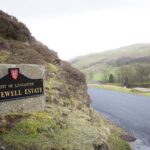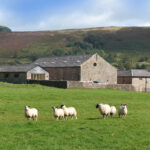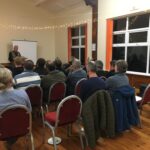Sustainable Land Management in Whitewell
The Duchy’s Lancashire estates team hosted a meeting of all agricultural tenants on the Whitewell Estate at the end of September to share knowledge and ideas around the best methods of regenerative farming and sustainable land management.
The evening began with an exploration of the ways in which the Duchy can best support tenants in their drive towards more sustainable land management, including the importance of both parties signing up to a joint Memorandum of Understanding in order to protect and improve both the land and the biodiversity of individual holdings over the longer term.
Speakers also included representatives from the Forest of Bowland AONB and the Ribble Rivers Trust. Sarah Robinson from the Forest of Bowland AONB gave a presentation on the Farming In Protected Landscapes (FIPL) grant scheme which supports a wide range of environmental and educational projects including initiatives which increase educational access to farms or enhance existing habitats. Speaking on behalf of the Ribble Rivers Trust, local farm advisors Kathryn Oddie and Heather Whalley highlighted a confidential whole farm audit available to any farmer in the Ribble Valley area free of charge. These audits offer practical advice on good land management practises, including water diffusion and flood management measures, and the Trust also offers a broad spectrum of training courses on issues as diverse as soil management and woodland creation.
The final speaker was one of the Duchy’s long-standing tenants, organic farmer John Alpe from New Laund Farm. Every acre of land currently farmed by Mr Alpe is covered by a stewardship scheme and he believes passionately that this has contributed significantly to his and his family’s success on the holding. The Alpes have seen an increase in the numbers of goldfinches, barn owls and oystercatchers in recent years and are hoping to see similar rises in the numbers of curlews and lapwings in due course.
Commenting on the event, Duchy Estates Director Laura Airton said: “We were delighted with the positive response from our tenants. All but one were present at the event and everyone who attended found it useful. We believe that this sort of informal information exchange and knowledge-sharing is key to the long-term improvement of our estates and are looking forward to attending similar events across each of the Rural Surveys in due course.”
At 2,578 hectares, Whitewell is the largest of the four estates which make up the Duchy of Lancaster’s Lancashire Survey. The other three are Myerscough, Salwick and Wyreside. Situated within the Area of Outstanding Natural Beauty of the Forest of Bowland, the Whitewell estate includes ten main farms, 40 residential properties and over 30 commercial and miscellaneous lettings.


